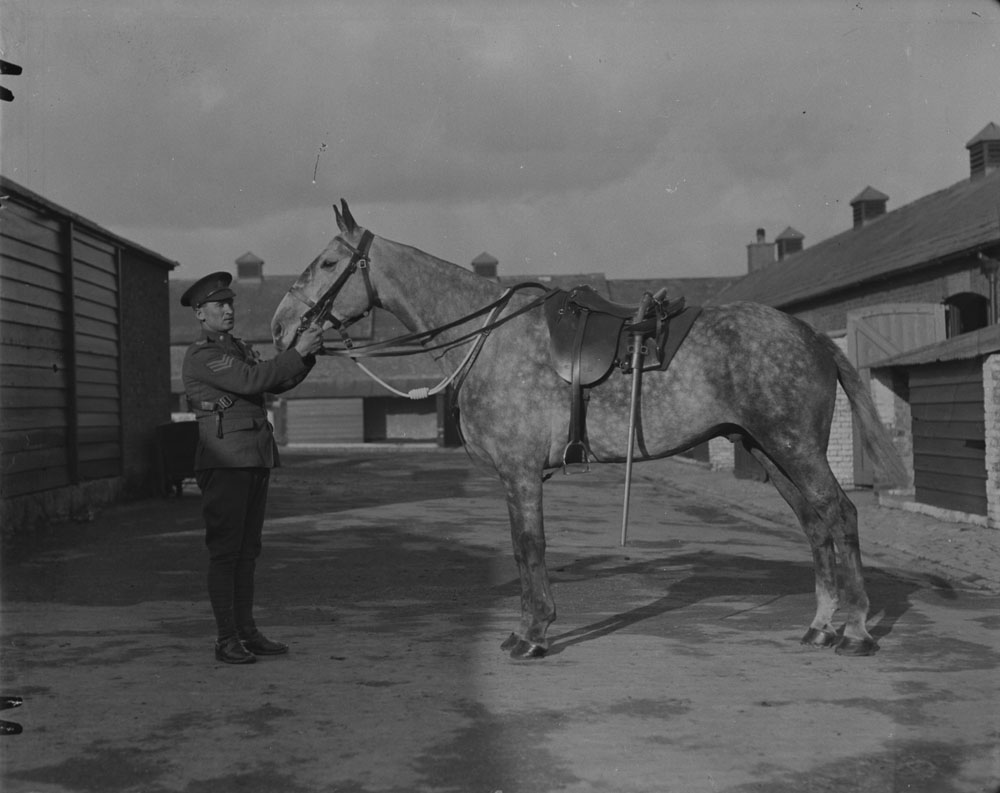Private Normand Weller initially served 17 months in France with the Canadian Field Artillery. Then, worn-out from his service on the Western Front, and admitted to hospital with Pleurisy in January 1917. Following seven weeks in hospital, Normand served the remainder of the Great War with the Canadian Army Veterinary Corps. Normand born 23 September 1886 in Montreal, Quebec. Normand a Master Carter (had his own business).

Service
Private Normand F. Weller sent $20 of his $30 monthly pay to his mother Mrs. Janet Weller, 244 St. Martin St., Montreal. Father Charles Edward Weller. Then, his sister, Ethel Langley, living at 15 Hughenden Road, High Wycombe, Bucks.
Firstly, this recruit medically examined and attested onboard SS MEGANTIC, 6 November 1914 in Montreal. In harbor, Lt.-Col. M.A. Peche approving, Captain Frederic Alphonse Daigneault witnessing. Then, Normand 28 years, 2 months of age, standing 5′ 6″ tall, 154 pounds, with fair complexion, blue eyes and light-brown hair. Scar over right eyebrow and left side of face. Finally, Normand suffered from chronic bronchitis, and had contracted syphilis in 1906, recovery incomplete.

Private Normand F. Weller attached to 8th Brigade, C.F.A., 5 October 1915. Then, transferred to Divisional Ammunition Column, Otterpool, 1 October 1915. Later, known as 6th Howitzer Brigade, 25 October 1915.
To France
Private Normand F. Weller entered France on 18 January 1916, with the 4th Brigade, C.F.A. Then, Taken on Strength 4th Brigade, CFA, 22 May 1916 on re-organization of CFA. In addition, ceases to be attached to 6th Brigade, C.F.A., 7 June 1916. Now, attached to 4th Brigade, C.F.A. Granted ten days leave, 15 December 1916. Finally, rejoined from leave, 29 December 1916.

During January of 1917, Private Normand Weller evacuated to hospital, No.1 Casualty Clearing Station, at Hersin-Coupigny.

Then, transported via No.1 Canadian Field Ambulance from No.1 Casualty Clearing Station, 26 January 1917.

Then, admitted to No.18 General Hospital, Camiers, Pleurisy (a condition in which the pleura, two large, thin layers of tissue that separate lungs from the chest wall, becomes inflamed), 26 January 1917.

Return to England
Admitted to Bevan Military Hospital, Sandgate, Pleurisy Slt., 4 February 1917. Firstly, Wasserman Reaction strongly positive. Then, admitted to Military Hospital, Shorncliffe, Pleurisy Slt., 8 February 1917. Then, ceases to be attached to 4th Brigade, C.F.A., 10 February 1917.
In addition, Private Normand Weller 48810, transferred to No.2 Section, C.A.V.C., with rank of A/Sergeant, 10 February 1917. Then, admitted to Canadian Convalescent Hospital Monks, Horton, Pleurisy Slt., 31 March 1917. Finally, admitted to Horton Hospital, Pleurisy Slt., and discharged 6 May 1917.

Admitted to No.14 Canadian General Hospital, Eastbourne, V.D.S. (Syphilitic Keratitis), 30 January 1918. Finally, after a long stay, A/Sergeant Weller discharged 6 March 1918.

Relinquishes rank of A/Sergeant and reverts to Private, 26 July 1918. Then, admitted Westcliffe Canadian Eye and Ear Hospital, Conjunctivitis, 27 July 1918. Discharged 24 August 1918. Then, admitted Canadian Hospital, Etchinghill, Iritis (left – swelling and irritation in the colored ring around the pupil), 9 September 1918. Finally, discharged 7 October 1918.

Demobilization
Returned per SS OLYMPIC, 14 December 1918. While unlimbering an ammunition wagon, fracture of scaphoid bone and carpus of external border of lower end of radius, 6 February 1919. Finally, treated by Major J.D. Morgan, A.M.C.

Discharged as medically unfit, 21 February 1919 in Montreal. Firstly, slight weakness of back, is unable to lift heavy objects. In addition, front teeth knocked out by horse. Also, moderate weakness of left wrist, chronic bronchitis and syphilis. Still complains of pain left side of thighs, but is of good general physical appearance.
Normand F. Weller died at 2101 University Street, Apt. 28., Montreal, 16 May 1953. Finally, Next-of-Kin his sister, Jeanette Sheriff, of 2101 University Street, Montreal. Buried at Mont Royal Cemetery.
More
Major Thomas Duncan John Ringwood in the Great War.

More
Please subscribe to CEFRG to be notified by email when there are new posts. Subscription is free, and your email kept confidential.
